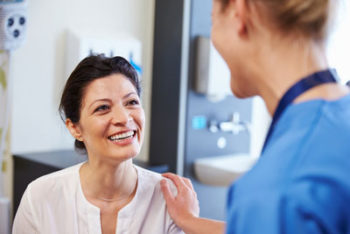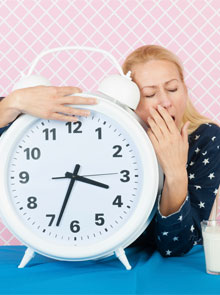GP, Dr Rosemary Leonard looks at the common health problems we women face, and which most often bring us to her rooms…
Problem: Bladder problems
The bladder sits right next to the womb and vagina, and this together with a short urethra, means that urine problems are common
Solutions: Empty your bladder after sex. This, along with a glass of cranberry juice every day will help to prevent cystitis. Using an oestrogen cream can help to boost natural levels and bring relief to frequent infections and dryness. Pelvic floor exercises are great for helping to prevent stress incontinence – where you accidentally leak urine when coughing or sneezing. If you have constant sudden urges to pass urine, try cut down on coffee and alcohol.

Problem: Weight gain
It’s an unfair fact of life that the older you get, the harder it is to lose weight. It’s because we all gradually lose muscle, which is the body tissue that burns the most kilojoules. Doing regular exercise will help to rebuild muscle, which in turn will boost your metabolic rate. Medical reasons can be:
An underactive thyroid- This can occasionally make it hard to lose weight.
Medications- Common culprits are some anti-depressants, some tablets used to treat Type 2 Diabetes, hormonal contraceptives, and HRT, and also steroids that are taken by mouth.
ALSO SEE: 6 Reasons Why You Can’t Lose Weight
Problem: Menstrual problems
Ever had a completely unexpected heavy period or missed one entirely? You’re not alone, especially if you’re in your late 40s. The ovaries can wind down in a very erratic fashion in the years approaching menopause.
Solutions: A short course of progesterone tablets can usually stop a one-off episode of heavy bleeding. The combined pill can be a good longer-term solution, or better still is a Mirena Device, which is fitted inside the womb.
Problem: Extreme fatigue
Rarely a day goes by without someone complaining that despite sleeping well, they feel constantly exhausted. A frantic lifestyle can be to blame, but there are often underlying medical causes, including: 
Low iron – This can be due to a combination of heavy periods, and a diet that includes very little red meat. In the past it was thought that you had to be anaemic to feel tired but now it’s been proven that just having low iron stores, even with a normal haemoglobin level, can sap your energy.
Type 2 diabetes – Sometimes the only symptom can be extreme fatigue.
READ MORE: Can A Diet Reverse Type 2 Diabetes?
Hormone changes – Notably the thyroid hormone, but also failing oestrogen levels at the time of menopause.
Depression – This can often make people feel tired, though in this case, it’s usually linked to a change in sleeping patterns.
Medication – These are often another cause of tiredness, especially painkillers containing codeine, some antidepressants and antihistamines, and also beta-blockers.
Solutions: Your doctor can test for these conditions, apart from depression, with some basic blood tests, or discuss possible changes due to regular medications.
PLUS: How To Recover From A Bad Night’s Sleep
Problem: General anxiety
It’s good that mental health problems are becoming less taboo and the diagnosis and treatment of anxiety and depression now form a large part of every GP’s daily workload.
Solutions: Antidepressants can be very helpful, especially for moderate or severe depression. Talking therapies, such as counseling, are now widely recognised as being helpful too. If you’re feeling worried or generally uptight, ask your doctor to see what type of treatment would be helpful for you.

